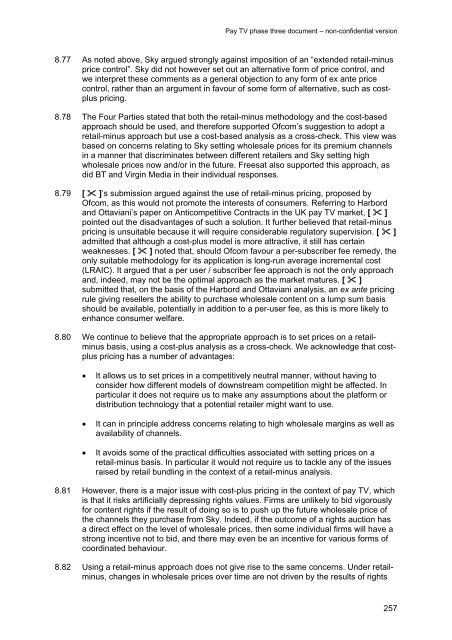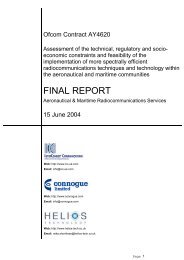Pay TV phase three document - Stakeholders - Ofcom
Pay TV phase three document - Stakeholders - Ofcom
Pay TV phase three document - Stakeholders - Ofcom
Create successful ePaper yourself
Turn your PDF publications into a flip-book with our unique Google optimized e-Paper software.
<strong>Pay</strong> <strong>TV</strong> <strong>phase</strong> <strong>three</strong> <strong>document</strong> – non-confidential version<br />
8.77 As noted above, Sky argued strongly against imposition of an “extended retail-minus<br />
price control”. Sky did not however set out an alternative form of price control, and<br />
we interpret these comments as a general objection to any form of ex ante price<br />
control, rather than an argument in favour of some form of alternative, such as costplus<br />
pricing.<br />
8.78 The Four Parties stated that both the retail-minus methodology and the cost-based<br />
approach should be used, and therefore supported <strong>Ofcom</strong>’s suggestion to adopt a<br />
retail-minus approach but use a cost-based analysis as a cross-check. This view was<br />
based on concerns relating to Sky setting wholesale prices for its premium channels<br />
in a manner that discriminates between different retailers and Sky setting high<br />
wholesale prices now and/or in the future. Freesat also supported this approach, as<br />
did BT and Virgin Media in their individual responses.<br />
8.79 [ � ]’s submission argued against the use of retail-minus pricing, proposed by<br />
<strong>Ofcom</strong>, as this would not promote the interests of consumers. Referring to Harbord<br />
and Ottaviani’s paper on Anticompetitive Contracts in the UK pay <strong>TV</strong> market, [ � ]<br />
pointed out the disadvantages of such a solution. It further believed that retail-minus<br />
pricing is unsuitable because it will require considerable regulatory supervision. [ � ]<br />
admitted that although a cost-plus model is more attractive, it still has certain<br />
weaknesses. [ � ] noted that, should <strong>Ofcom</strong> favour a per-subscriber fee remedy, the<br />
only suitable methodology for its application is long-run average incremental cost<br />
(LRAIC). It argued that a per user / subscriber fee approach is not the only approach<br />
and, indeed, may not be the optimal approach as the market matures. [ � ]<br />
submitted that, on the basis of the Harbord and Ottaviani analysis, an ex ante pricing<br />
rule giving resellers the ability to purchase wholesale content on a lump sum basis<br />
should be available, potentially in addition to a per-user fee, as this is more likely to<br />
enhance consumer welfare.<br />
8.80 We continue to believe that the appropriate approach is to set prices on a retailminus<br />
basis, using a cost-plus analysis as a cross-check. We acknowledge that costplus<br />
pricing has a number of advantages:<br />
� It allows us to set prices in a competitively neutral manner, without having to<br />
consider how different models of downstream competition might be affected. In<br />
particular it does not require us to make any assumptions about the platform or<br />
distribution technology that a potential retailer might want to use.<br />
� It can in principle address concerns relating to high wholesale margins as well as<br />
availability of channels.<br />
� It avoids some of the practical difficulties associated with setting prices on a<br />
retail-minus basis. In particular it would not require us to tackle any of the issues<br />
raised by retail bundling in the context of a retail-minus analysis.<br />
8.81 However, there is a major issue with cost-plus pricing in the context of pay <strong>TV</strong>, which<br />
is that it risks artificially depressing rights values. Firms are unlikely to bid vigorously<br />
for content rights if the result of doing so is to push up the future wholesale price of<br />
the channels they purchase from Sky. Indeed, if the outcome of a rights auction has<br />
a direct effect on the level of wholesale prices, then some individual firms will have a<br />
strong incentive not to bid, and there may even be an incentive for various forms of<br />
coordinated behaviour.<br />
8.82 Using a retail-minus approach does not give rise to the same concerns. Under retailminus,<br />
changes in wholesale prices over time are not driven by the results of rights<br />
257
















